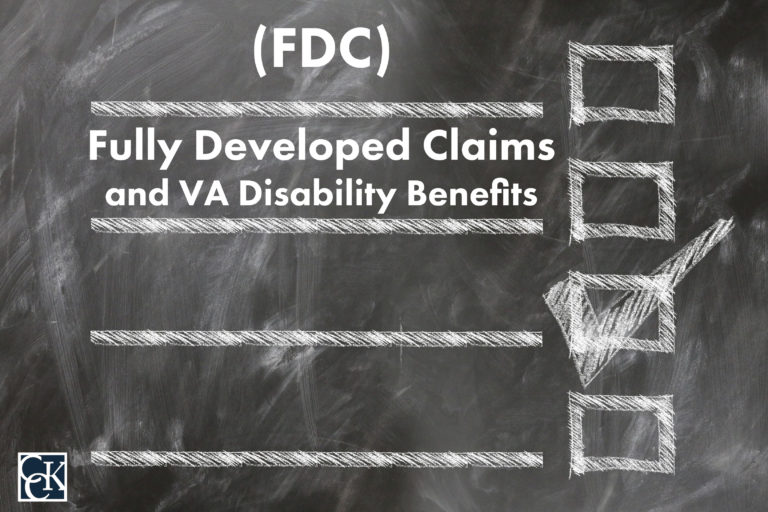Filing Fully Developed Claims (FDC) for VA Disability Benefits

CCK Law: Our Vital Role in Veterans Law
The Fully Developed Claims (FDC) program is an optional way to file your claim for disability compensation, pension, and survivor benefits. A veteran can opt to file a fully developed claim when he or she has all the evidence they would like VA to consider when deciding the claim. Upon submitting the claim, the veteran certifies that there is no additional evidence needed, thus enabling VA to make a decision more quickly.
It is important to note that veterans should be sure that they have collected all the evidence that they want VA to consider in its decision. This is because the concept of a Fully Developed Claim essentially signals to VA that there is no additional evidence the veteran needs to support their claim.
Once the process of starting a fully developed claim has been initiated, the veteran has up to one year to complete it. In the event the VA rules in the veteran’s favor, they will be paid back to the date they started the fully developed claim.
How is Filing a Fully Developed Claim (FDC) Different Than a Regular VA Claim?
The FDC process differs from filing a traditional claim in the way in which evidence is developed and acquired. Ultimately, the standard manner of developing and acquiring evidence can correlate to longer wait times for a decision.
In the standard claims process, a veteran files a claim which triggers a development process so VA can gather the required information to decide the claim as part of its duty to assist. In this process, VA has more responsibility to obtain the information required to support veterans’ claims. Despite this increased responsibility to obtain information, VA can also take significant time to collect the evidence which can add to the amount of time it takes the veteran to receive a decision.
If the veteran wishes to opt into the Standard Claim Process, they will want to specify that on VA Form 21-526EZ by marking the box under Item 1 at the very top of the form.
Contrarily, a Fully Developed Claim is submitted with all the necessary evidence, meaning that VA does not have to do any additional development for the veteran and can, in theory, issue a decision sooner than if they had to go obtain the evidence.
Why You May Want to File a Fully Developed Claim (FDC)
An FDC requires that you do the development work of gathering evidence to support your claim, a task that traditionally falls to VA. However, for veterans who are concerned about long processing times for their claims, filing an FDC may be the best option.
The FDC allows the veteran to control the evidence gathering part of the claims process. The veteran gathers all evidence, including military records and medical records, and certifies that they are submitting all of their evidence at once.
You may be concerned that you will forget to submit a piece of evidence, but the FDC program is risk-free. If you discover additional evidence to support your VA claim, you will still be able to submit that new evidence. However, the claim will then be placed into the Standard Claim Process upon this submission. Additionally, if VA determines that more evidence is required, the claim will also be moved to the Standard Claim Process.
If this is the case. VA will notify the veteran that his or her claim cannot be processed as an FDC claim and will be processed as a standard claim. This can add delays to a claim, but it is better that a decision be made with all evidence rather than without.
What Kind of Claims Can You File as Fully Developed?
Veterans can file multiple kinds of claims in the FDC program, including claims for disability compensation, pension, claims to reopen a claim, and claims for secondary service connection. Importantly, veteran’s surviving spouses and dependents may also file for survivor benefits as Fully Developed Claims.

Advantages and Disadvantages to Filing a Fully Developed Claim
Advantages of FDCs
Filing a fully developed claim means that you must do the development work of gathering evidence to support your claim, a task that traditionally falls to VA. However, for veterans who are concerned about long processing times for their claims, filing a fully developed claim may be the best option. Reasons you may want to file an FDC include:
- You Have More Control
- The FDC allows veterans the opportunity to manage the evidence gathering part of the claims process.
- The veteran gathers all evidence, including military records and medical records, and certifies that they are submitting all their evidence at once.
- The FDC Program is Risk-Free
- Some veterans may feel anxious about submitting their own evidence and be concerned about missing something. However, if VA determines that there is more evidence required, the FDC claim can be switched to a standard claim.
- VA will notify the veteran if the VA decides that the veteran’s claim cannot be processed as an FDC. Though this may add delays to the claim, it still means the veteran will receive a decision and all the evidence will be included.
- Faster Decision Time
- FDCs may lead to faster decisions. This is because the veteran is responsible for collecting all the evidence and may be able to do so quicker than the VA would.
Disadvantages of FDCs
Fully developed claims are not for everyone. VA’s evidence requirements can be confusing to understand and difficult to meet, so it may be beneficial to have VA assist you in gathering evidence. Reasons an FDC might not work for your claim:
- Medical evidence
- Oftentimes, VA will want to conduct their own exam, known as a compensation and pension exam. VA typically does not make decisions based solely on private medical reports. It can also be difficult for veterans to gather all the necessary evidence without VA’s assistance.
- Additional Development
- In many cases, VA determines that additional development is needed. This means that the case gets switched from a Fully Developed Claim into the Standard Claims Process. This means the claim still is processed normally, and the veteran will still receive a decision, it may just take longer.
How to File a Fully Developed Claim
VA has provided a checklist to follow when filing your FDC, but to sum it up:
- Initiate Your Claim—You begin by logging into your VA.gov account and initiating your claim for disability compensation. You have a year from the day you initiated your claim to formally submit your claim. VA will not process your claim until you submit it.
- Provide Details About Your Federal/State Records—You will then need to tell VA about your federal records including military medical and personnel records, and any relevant records from another federal agency, such as Social Security. You will then gather your non-federal records, such as private medical records.
- Gather Non-Federal Records—VA has also stated that getting your medical provider to fill out your Disability Benefits Questionnairewill further speed up the process. This is not a required part of filing an FDC, but if you have the ability to do it, go ahead. You might also want to gather other private medical records, treatment records, and lay statements.
- Select Your Claim Type—You will then need to select what type of claim you are filing, whether it is an original claim, claim for increased disability, or another type of claim. Each of these claims have different evidence requirements, so be sure to look at what is needed before you submit your claim.
- Upload All Documents—You will need to upload all your evidence, checking to make sure you are submitting all necessary documents.
- Verify and Submit—Once you have uploaded all of your documents, verified that you have “No More Evidence,” and clicked “Submit,” you have successfully completed your FDC.
Reasons Might VA Exclude a Claim from the FDC Process
As mentioned above, VA might determine that additional evidence or development is needed to adjudicate a claim that has been filed as an FDC. If so, VA will notify the veteran that the claim is being transferred to the Standard Claims Process. Below are some additional reasons why the VA may reject a claim from the FDC process:
- Evidence was submitted after the FDC was received
- Anytime evidence for an FDC is submitted after the initial fully developed claim was received by VA, VA will generally switch the claim from the FDC process into the Standard Claim Process. This happens because the FDC Claim Process is used when the veteran has already submitted all the evidence necessary to adjudicate the claim. If more evidence is submitted after the fact, then that claim needs to be moved to the Standard Claim Process in order for the additional evidence to be considered.
- Issues with the claim form
- There are many issues within the claim form that can cause VA to reject it as an FDC. Usually, these can occur if the form is not signed, or not filled out correctly. Additionally, if the veteran does not use the correct form (VA Form 21-526EZ) then VA may not accept the claim as a Fully Developed Claim.
- An additional claim was submitted after the FDC claim
- If the veteran submits another claim after they already submitted the FDC claim, VA may then remove the FDC claim from the Fully Developed Claim process and instead adjudicate both claims in the Standard Claims Process.
- Another claim was already pending when the FDC was submitted
- If the veteran already has a claim pending, and then tries to submit another claim for the same condition as an FDC, the claim will typically be processed through the Standard Claim Process. This is because a Fully Developed Claim requires that all evidence be submitted upfront meaning that the veteran generally cannot change their mind and decide to file a claim as an FDC after it has already been filed through the Standard Claims Process.
- Failure to report to an exam
- It is extremely important to attend any VA examinations that VA requests. Failure to attend an exam, or to follow up with scheduling an exam that VA has requested, can result in a denial of benefits. Additionally, if the veteran does not follow up with development requested by VA, the claim can be taken out of the FDC Process and placed into the Standards Claim Process.
Was Your VA Disability Claim Denied?
If after filing your FDC you received an unfavorable decision or denial from VA, the team at Chisholm Chisholm & Kilpatrick LTD may be able to help. Our veterans’ attorneys have helped thousands of veterans through the appeals process. Call us today at 800-544-9144 for a free case evaluation.
About the Author
Share this Post

